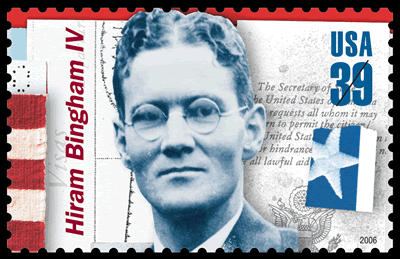Profiles in Character #13: Harry Bingham Saves World War II Refugees
In 1937, Hiram Bingham IV, just 34 years old, was posted by the State Department to Marseilles as Vice-Counsel. In June 1940, the French government surrendered to Adolph Hitler’s forces. In Article 19 of the armistice, France agreed to “surrender on demand all Germans named by the German government in France.” This launched a roundup of German and Jewish refugees who were then taken to Nazi concentration camps. The American government, which wanted to limit immigration and also maintain good relations with the new Vichy government in France, refused most requests to issue visas to refugees.
That did not stop Harry Bingham. An Emergency Rescue Committee, established earlier with the support of Eleanor Roosevelt, had compiled a list of Jewish artists and intellectuals and sent Varian Fry, an American journalist, to Vichy France to help them escape. Bingham was already issuing visas and worked closely with Fry to issue more, ignoring instructions from his own supervisors.
Among those he helped escape were political theorist Hannah Arendt and painter Marc Chagall, the latter of whom had to be rescued from a police roundup of Jews. Bingham also gave some refugees protection in his home until he could get them out. On his own authority, Bingham ultimately issued about 2,000 travel visas and fake passports. As Bingham related on a tape not found until the 1990s, “My boss, who was the consul general at the time, said: 'The Germans are going to win the war. Why should we do anything to offend them?' But, I had to do as much as I could.”
Eventually, Cordell Hull, Secretary of State got wind of what Bingham and Fry were doing after complaints from German and French officials. In a September 18, 1940 telegram to the embassy in Vichy, Hull warned that “this government cannot repeat nor countenance activities . . . evading the laws of countries with which the United States maintains friendly relations.” Bingham was undeterred, so on May 7, 1941, he was ordered to leave his post and relocate to Lisbon. Fry bemoaned that step, remarking that Bingham “had been the one man at the Consulate who had always seemed to understand that his job now is not to apply rules rigidly but to save lives whenever he could.”
After a brief assignment in Portugal, Bingham was send to Buenos Aires in September 1941. By 1944, he was beginning to see that some Nazis were escaping Germany and relocating in Argentina. In a number of memos he alerted higher level officials and pleaded that American military personnel be sent to Argentina to find and arrest these fascists. When the State Department refused to act and continually passed over Bingham for promotion, he resigned in protest in 1945.
Bingham never talked to his eleven children about what he had done. His son, Robert Bingham, recalls many conversations about ethics and religion and that his father often reminded him that there is a “spark of divinity in every human being” and the importance of “doing unto others.” Yet it was not until after Bingham’s death in 1988 that his son learned of the defiance his father had exercised in Marseilles and how many lives he had saved.
Characteristic of the humble man he was, he almost never spoke of what he did. Harry Bingham earned no acclaim in the United States until more than sixty years after he left France. Finally, on June 27, 2002, Secretary of State Colin Powell presented the American Foreign Service Association’s “Constructive Dissent” award posthumously to his children. On May 30, 2006, the U.S. Postal Service issued a postage stamp in his honor as part of a series on “Distinguished American Diplomats.”
Harry Bingham’s life is a potent reminder that conscience and moral courage in service to human freedom and dignity are the ultimate guides for any public servant.
Photo Credit: U.S. Postal Service






